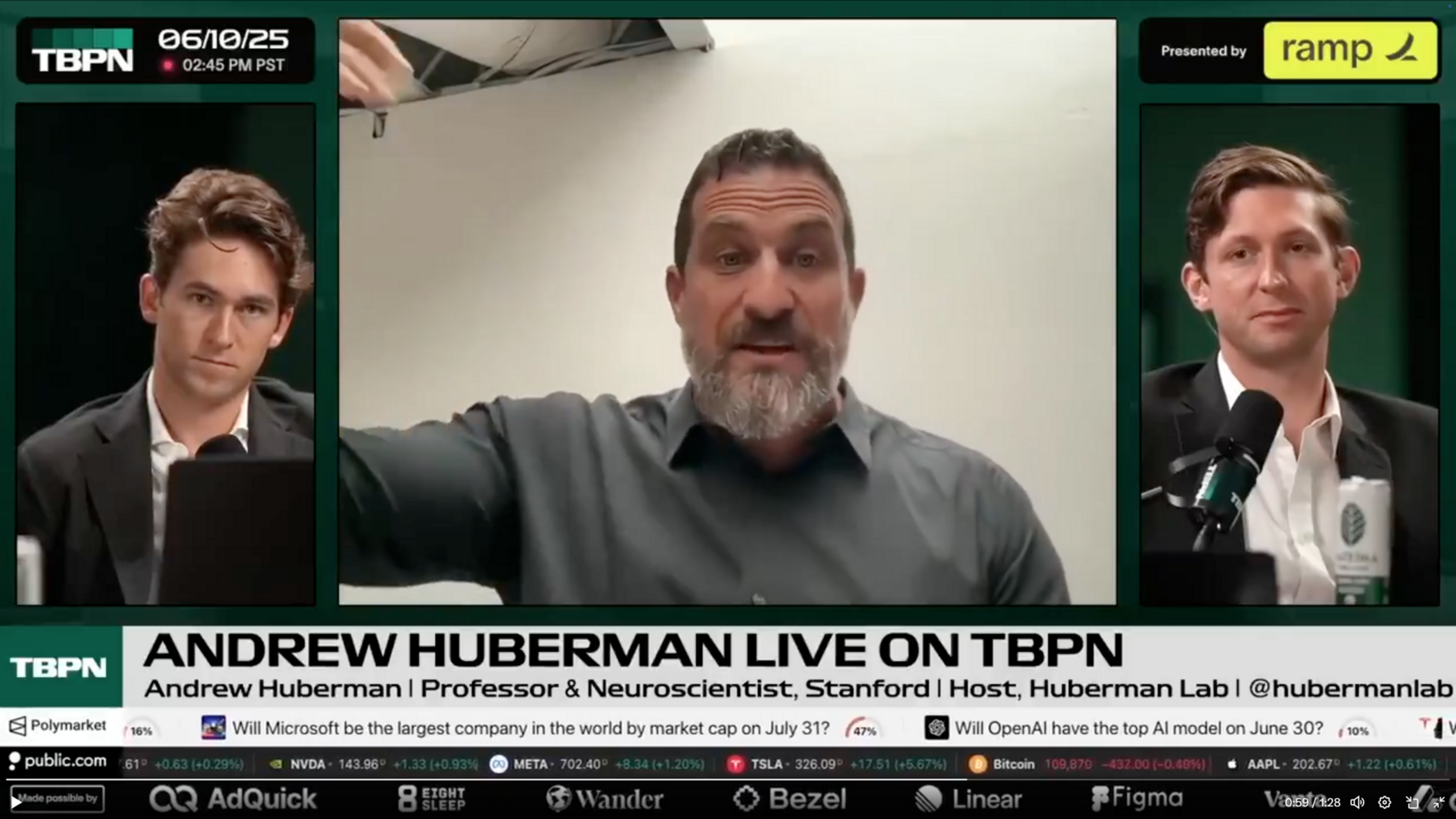Seeing an incomprehensible viral tweet from a top VC — or getting into an extended conversation with a tech bro — can be a disorienting experience.
And that was before they developed their own language. The rise of Tech Bro 2.0 has brought with it a lexicon that has started to leach into social media and the IRL landscape of San Francisco and beyond.
To think like a tech bro, you have to talk like one. Because some of their terms are so internet-pilled that even the new AirPods can’t translate them, we’ve put together a handy collection that will help you feel confident at your next hackathon.
agentic workflow (n): A process in which AI agents operate autonomously, making decisions and taking actions with minimal human intervention. See also: White-collar labor market collapse.
AGI (n): Short for “artificial general intelligence,” it’s a hypothetical general-purpose AI system that can complete almost all cognitive tasks a human can do. Building AGI — and feeling it as it arrives — is the expressed goal of Silicon Valley’s biggest companies.
based (adj): A term of praise, embraced by the alt-right, for people who are “un-woke.” Popularized by rapper Lil B, the word has gotten new life from a certain set of social media users. As in: “Did you see Mark Zuckerberg’s appearance on Joe Rogan? It was based as fuck.”
clanker (n): The go-to slur for AI and robots. As in: “Get these filthy clankers off the streets.” The term was popularized by the animated science-fiction series “Star Wars: The Clone Wars,” in which it was used as a derogatory term for battle droids. See also: Bot, bucket of bolts.
Cluely (n): A startup that makes an undetectable desktop app meant to help you “cheat on everything” by providing real-time assistance during work meetings, sales pitches, and job interviews. You can characterize the annoying, attention-grabbing schemes pursued by early-stage companies as part of the Cluely-fication of the industry.

cracked (adj): Highly skilled, especially at coding. As in: “I’m looking for the most cracked founding engineer, like, someone who chugs eight cans of Celsius a day.”
decel (n): Short for “decelerationist,” used to describe someone who opposes rapid technological progress, particularly in AI, often arguing for slowing down development to reduce risk.
first principles (n): The process of breaking things down to their most fundamental truths and reasoning up from there, instead of relying on assumptions, analogies, or “the way it’s always been done.” Formerly called “inductive reasoning.” If you don’t drop “first principles thinking” on a podcast, are you even a tech bro?
forward-deployed engineer (n): A software engineer who is embedded with clients to adapt complex AI into usable tools. Unlike headquarters-based engineers, forward-deployed engineers work “on the front lines,” in a model pioneered by Palantir that is now common at AI firms. Their unofficial job description: smile and nod while duct-taping buggy AI into something barely usable.
hard tech (n): After years of making consumer apps, Silicon Valley is now in its “hard tech era,” defined by capital-intensive pursuits in AI, defense, and space. However, since it was written about in The New York Times, the term might already be dead.
high agency (n): The ability to take initiative and shape outcomes rather than being passively shaped by them. As in: “I’ll invest only in founders with high agency who will bend reality (or at least Reddit) to their will.”
in the trenches (preposition): The proverbial place one goes to “lock in.” Generally, it’s a crumpled mattress on the floor of a legally dubious live-work space.
–maxxing (suffix): Optimizing a certain behavior or trait; e.g., looksmaxxing, proteinmaxxing, cloutmaxxing. Also works when you’re chillin’ out and relaxin’ all cool.
nerd snipe (n): A problem or puzzle so technically intriguing that it hijacks a nerdy person’s brain, distracting them from what they should be doing. Usually, the distraction adds no value to the world. As in: “Crypto is a nerd snipe.”
ngmi (phrase): Short for “Not gonna make it.” As in: “If your startup isn’t based in San Francisco, ngmi.”
NPC (n): Short for “nonplayer character,” a term borrowed from gaming that has become Elon Musk’s favorite insult. It’s used to describe people who don’t seem to think independently and aren’t the main players in society. As in: “Bro is an NPC; he just wakes up, works, and scrolls TikTok.”
orthogonal (adj): Jargon for something that is independent of something else. If two variables are orthogonal, changes in one don’t predict or affect changes in the other. When someone says, “That’s orthogonal to our current problem,” they mean: “It’s a separate issue.” They also mean: “I’m a pretentious ass.”
peptides (n): Short chains of amino acids that form the building blocks of proteins. Think chemicals — largely sourced from China — that techies are injecting into themselves to improve their health and performance. One San Francisco company even offers free peptide injections to staff on Fridays. Turns out, selective IV drug use is accepted in the industry.

permanent underclass (n): A category of people excluded from economic, social, or political mobility after the advent of artificial general intelligence. To escape becoming locked in this “permanent underclass,” some tech bros are trying to amass as much wealth as possible before the clankers take over.
pro-natalist (n): Someone who believes it is important to increase birth rates. Elon Musk, one of Silicon Valley’s loudest and most prolific pro-natalists, says declining birth rates are “one of the biggest risks to civilization.” Left unsaid: In this economy??
rizz (n): Short for “charisma.” As in: “Can we find a single person with rizz in this entire town?”
skill issue (n): A dismissive phrase used to suggest that someone’s failure or frustration is due to their lack of ability rather than external factors. As in: “You can’t bike up Hawk Hill? Skill issue.”
slop (n): The unbearably high volume of low-effort, mass-produced words, images, and video spit out by AI. For example, a Facebook video that confuses your mom into believing that cats can cook omelets on the stove.
spiky talent (n): The quality of someone who has extreme strengths in a few areas but isn’t well-rounded. Instead of having a “smooth” or generalist profile, their abilities look like sharp “spikes.” As in: “Seek out spiky talent and bet on prodigies early.”
TBPN (n): Short for “Technology Business Programming Network,” a marathon three-hour talk show hosted every weekday by tech bros in suits John Coogan (cofounder of Soylent) and Jordi Hays. If you haven’t been asked to appear, you’re ngmi.

The Great Lock In (n): The follow-up to “locking in,” meaning to get serious and heads-down on a task. The Great Lock In takes that focus to an extreme via a social media challenge in which people vow to grind from Sept. 1 until the end of the year. In San Francisco, The Great Lock In means grinding at least 996 — 9 a.m. to 9 p.m., six days a week. See also: Burnout is a myth.
The Gundo (n): Short for “El Segundo,” the beachside city in Southern California that has become a geographic hub for defense tech companies. Like Haliburton, but younger and with more anti-China sentiment. See also: Killi-con Valley.
tiz/tism (n): Short for “autism.” As in: “This guy’s rizz is no match for his tiz.”
wagmi (phrase): The opposite of ngmi: “We’re all gonna make it.” Also known as wishful thinking.
What are you building? (phrase): Beware. In startup-obsessed San Francisco, you will be asked this question before you’re asked your name. The correct answer is: “World-changing tech that will redefine what it means to be a human.” Or, you know, “An ChatGPT wrapper.”
ZIRP (n): Short for “zero interest rate phenomenon,” or the trends that emerged during the past decadent era in tech, when investor money was as free-flowing as DEI initiatives. Examples include high-end employee cafeterias, fully remote work, and Burning Man.

